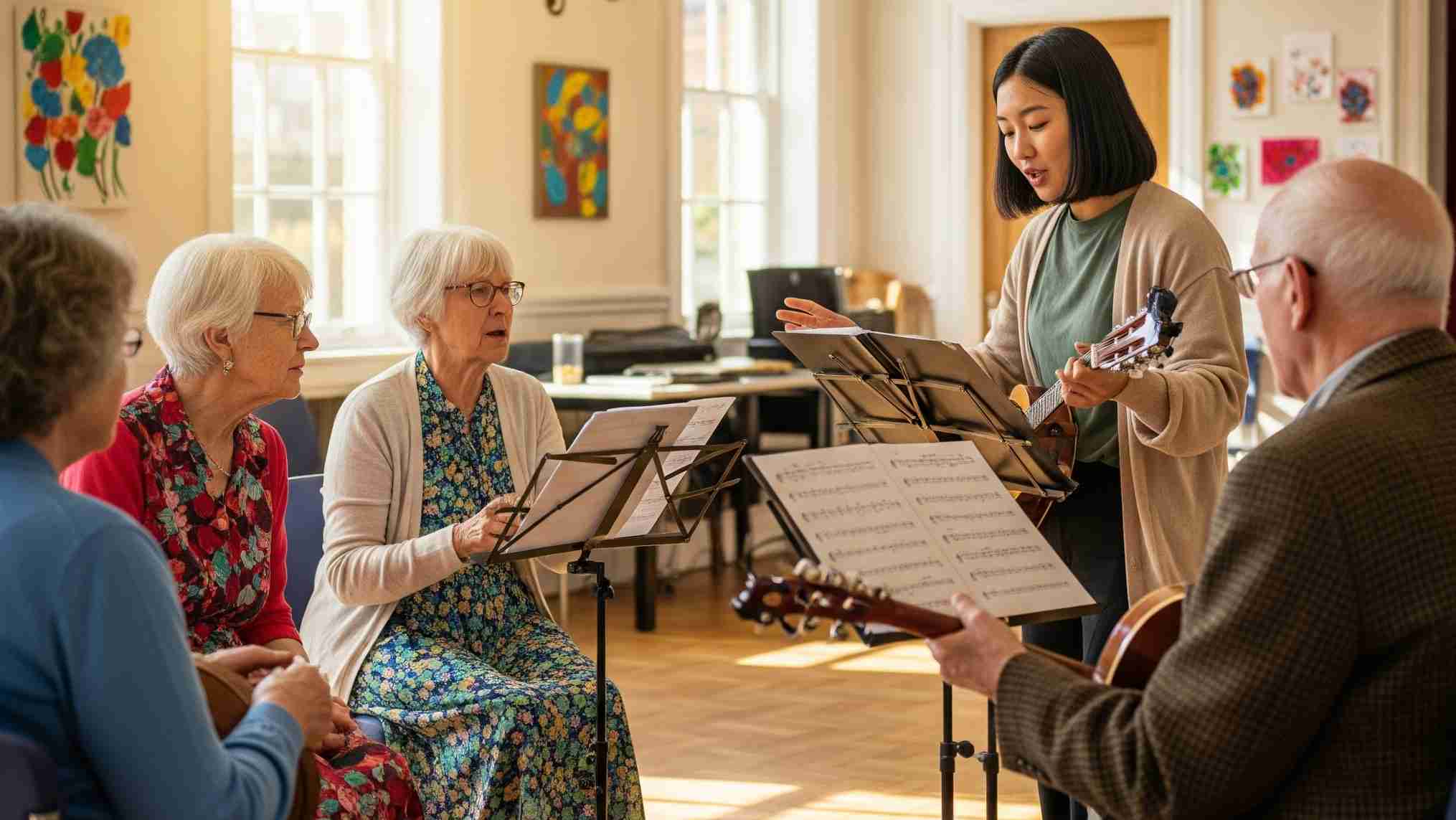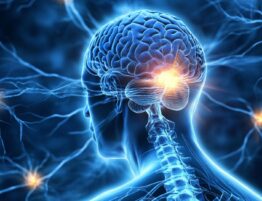The experiences we have as children can shape our brains for a lifetime. And learning music might be one of the most impactful. Engaging with music through playing an instrument or singing stimulates the brain in unique ways. It helps build skills that may protect against mental decline as we grow older.
Musical training during childhood enhances development. It improves memory, focus, and emotional regulation. These early benefits contribute to lifelong cognitive skills. Those support brain health well into adulthood. The brain’s ability to adapt, known as neuroplasticity, is strengthened by music. It helps it remain resilient during aging.
Modern research suggests that early musical experience creates a foundation for mental flexibility. It can potentially reduce the risk of memory loss or cognitive impairment later in life.
This article explores how musical training in childhood:
- Influences brain development
- Supports cognitive abilities across the lifespan
- May act as a shield against age-related mental challenges
Understanding these connections helps parents see why encouraging kids to engage with music is an investment in their future brain health.
How Musical Training Enhances Childhood Brain Development
Musical training is a powerful tool for shaping young minds. It engages multiple brain areas to support childhood development. When children learn to play an instrument or sing, they activate regions responsible for:
- Memory
- Attention
- Motor skills
- Emotional processing
This multi-faceted engagement strengthens neural connections. It lays a foundation for cognitive growth. A 2013 study found that children who played instruments showed enhanced activity in the prefrontal cortex. This is the brain area tied to decision-making, problem-solving, and impulse control.
Music also boosts neuroplasticity, the brain’s ability to form new connections and adapt. Practicing scales, memorizing songs, or coordinating rhythm and melody exercises memory and fine motor skills. It creates robust neural pathways.
A 2016 study from the Brain and Creativity Institute at USC revealed that children in music programs had faster brain development. These areas were linked to language, reading, and reasoning compared to peers without musical training. These benefits extend beyond music. They improve academic performance in subjects like math and literacy. By challenging the brain early, music fosters mental agility. It supports learning and growth throughout life.
Here’s how musical training enhances childhood development:
- Improves memory. Memorizing melodies and rhythms strengthens recall.
- Enhances focus. Sustained attention during practice builds concentration.
- Strengthens coordination. Playing instruments improves hand-eye synchronization.
- Boosts language skills. Rhythm and pitch recognition aid language processing.
Musical Experience and Lifelong Cognitive Skills
The cognitive skills gained from early musical training don’t fade. They provide lasting benefits for brain health throughout life. Learning music hones abilities like memory, attention, problem-solving, and emotional regulation. They remain valuable in adulthood. These skills translate into practical advantages, such as:
- Better academic performance
- Improved workplace efficiency
- Stronger interpersonal relationships
A 2014 study in Frontiers in Psychology found that adults who had musical training as children performed better on tasks. These required focus, multitasking, and mental flexibility compared to those without musical backgrounds.
Music also fosters emotional intelligence, a key cognitive skill. Learning to express and interpret emotions through music helps manage stress. And it helps maintain mental clarity. This emotional balance supports brain health by reducing the strain on cognitive resources. A 2020 study in Brain and Cognition showed that adults with childhood music experience had better working memory and quicker cognitive processing speeds. These advantages help people navigate complex tasks. They can adapt to new challenges and maintain mental sharpness. Early musical training acts as a lifelong asset. It equips the brain with tools to thrive in various settings.
Key cognitive skills strengthened by music include:
- Memory retention. Enhanced ability to store and recall information.
- Sustained attention. Improved focus for completing tasks efficiently.
- Problem-solving. Pattern recognition from music aids analytical thinking.
- Emotional regulation. Managing stress through musical expression.
The Link Between Music and Neuroplasticity in Aging
As we age, the brain’s ability to adapt becomes critical for maintaining mental sharpness. Musical experience, particularly from childhood, supports this adaptability during aging. Playing an instrument or singing keeps the brain active. It encourages the formation of new neural connections even in later years. A 2017 study in Cerebral Cortex found that older adults with musical training showed greater brain plasticity. It allowed them to better handle age-related mental changes compared to non-musicians.
Music engages multiple brain regions simultaneously. It acts like a full-brain workout. This stimulation helps preserve cognitive reserves. These are the brain’s backup resources for managing challenges. A 2019 study in Frontiers in Neuroscience showed that older adults who played music in their youth had superior:
- Memory
- Reasoning
- Verbal fluency skills
These individuals were also better at adapting to new tasks. For example, learning technology or solving puzzles. By keeping the brain flexible, music helps older adults maintain independence and mental agility. Whether it’s revisiting an old instrument or joining a community choir, music supports a resilient brain during aging.
Benefits of music for neuroplasticity in aging:
- Strengthens neural connections: Active engagement fosters brain adaptability.
- Enhances cognitive reserves: Builds mental resources for resilience.
- Improves memory and reasoning: Supports recall and problem-solving.
- Encourages lifelong learning: Promotes adaptability to new challenges.
The connection between music and neuroplasticity offers a powerful tool for healthy aging. Engaging with music stimulates multiple brain regions. It fosters new neural pathways and enhances cognitive reserves. Whether through playing an instrument or singing, this mental workout sharpens memory, reasoning, and problem-solving skills. It also promotes adaptability, enabling older adults to navigate life’s challenges with greater ease.
Studies show that musical experience equips the brain to better handle age-related decline. By incorporating music into daily life, older adults can cultivate resilience. Whether it’s through practice, performance, or community involvement, they can maintain independence and enrich their cognitive vitality well into their later years.
Reducing Cognitive Decline With Early Music Training
Early musical training may serve as a protective shield against cognitive decline. It offers long-term benefits for brain health. People who learned music as children have a lower risk of developing conditions like dementia or Alzheimer’s later in life. A 2022 study in Brain and Cognition found that adults with at least five years of childhood musical training had lower risk of cognitive impairment compared to those without. This protection likely stems from the cognitive reserves built through music. It helps the brain compensate for age-related decline.
The mental demands of music are memorizing notes, coordinating movements, and processing rhythms. They create a robust neural network that supports memory, attention, and problem-solving. A 2014 study from Brain and Cognition showed that former child musicians had thicker gray matter in brain areas tied to memory and executive function, even decades later. This structural advantage may slow the progression of cognitive decline. Also, music’s emotional and social benefits further protect the brain. These include reducing stress and fostering community through group activities like choirs. Encouraging children to learn music can be a simple yet powerful way to safeguard their mental health.
How music helps reduce cognitive decline:
- Builds cognitive reserves. Delays the onset of impairment.
- Strengthens brain structure. Enhances memory and attention areas.
- Reduces stress. Lowers risk factors for cognitive decline.
- Promotes social engagement. Group music activities foster connection.
The benefits of musical training in childhood extend far beyond creating music. They lay a foundation for a healthier, more resilient brain. By enhancing development, music builds neural pathways. These support learning, focus, and emotional regulation. These early experiences translate into cognitive skills. Those improve academic, professional, and personal success throughout life. As we age, the neuroplasticity fostered by music keeps the brain adaptable. It helps it stay sharp despite natural changes. Most importantly, early music training offers a buffer against cognitive decline. It potentially reduces the risk of serious cognitive issues.
Parents, educators, and communities can play a vital role in making music accessible to children. Schools can prioritize music programs. They can offer lessons or band opportunities. Meanwhile, parents can encourage kids to:
- Try instruments
- Sign in choirs
- Explore music apps
Even simple activities, like singing together or playing rhythm games, can provide cognitive benefits. For adults who missed out on childhood music, it’s never too late to start. Research shows that learning music later in life still boosts brain health. For example, a 2023 study in Frontiers in Aging Neuroscience found that older adults who began music lessons showed improved memory and mood.
Here are practical ways to encourage musical engagement:
- Enroll kids in school music programs or affordable private lessons.
- Use free music apps or online tutorials for beginners, like Simply Piano.
- Join community choirs or bands for social and cognitive benefits.
- Encourage daily practice, even 10-15 minutes to maximize brain-building effects.
- Explore group music activities, like family jam sessions, to foster connection.












I've given up... the stress her office staff has put me through is just not worth it. You can do so much better, please clean house, either change out your office staff, or find a way for them to be more efficient please. You have to do something. This is not how you want to run your practice. It leaves a very bad impression on your business.
Please, leave your review
Write a comment: